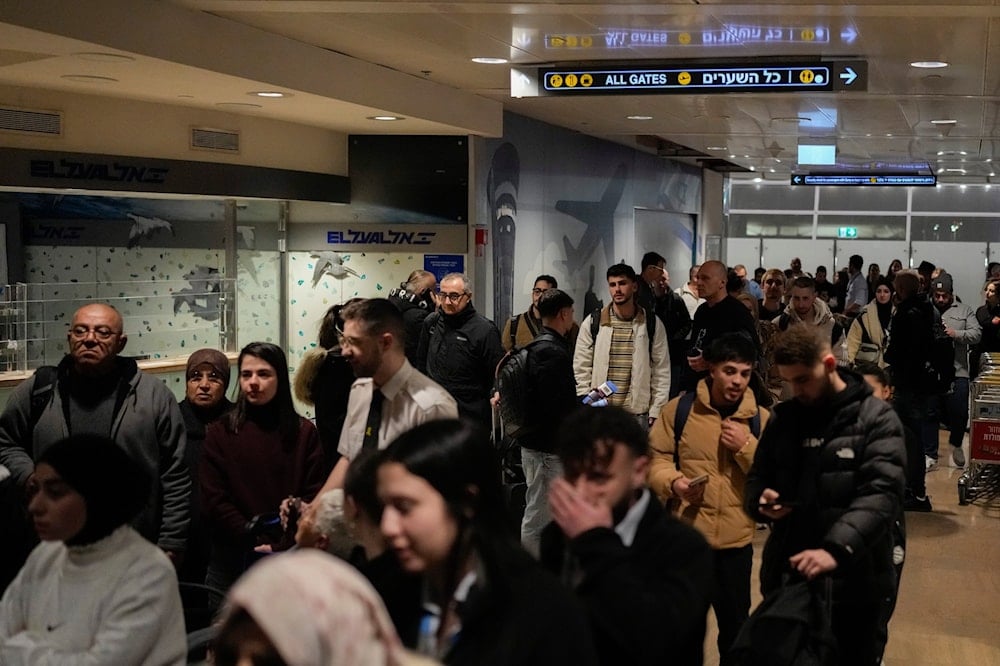Ben Gurion flight suspensions disrupt travel, economy
Airlines halt Tel Aviv flights after a Yemeni missile hit Ben Gurion Airport, straining tourism, local carriers, and "Israel’s" economic outlook.
-

Israelis rush toward a shelter after airstrike sirens sounded off in Ben Gurion Airport, near Tel Aviv, early Friday, Jan. 3, 2024. (AP)
A wave of global airline announcements has followed the suspension or cancellation of flights to the Ben Gurion airport in Tel Aviv, especially after the airport was reportedly targeted by a hypersonic ballistic missile launched from Yemen, according to Israeli media.
Air India, Germany’s Lufthansa Group, British Airways, US-based Delta Air Lines, and Hungary’s Wizz Air all announced the suspension of their flights for varying periods throughout the month.
Despite a sharp rise in the shares of Israeli airlines on Sunday, this activity masks troubling economic indicators, especially in vulnerable sectors like the low-skilled labor market.
Alongside the current withdrawal of foreign airlines, tens of thousands of military reserve call-up orders continue to be issued, signaling a potential return to intense fighting in the Gaza Strip, as per Israeli media. This mirrors the scenario that unfolded from late 2023 until the ceasefire at the end of 2024, during which "Israel" experienced a major drop in air travel.
Temporary boost for Israeli airlines due to lack of competition
According to a study by the Bank of Israel, air transport activity rose by 12.2% in 2024 compared to 2023, reaching 10.9 billion shekels, up from 9.7 billion the previous year.
This increase is attributed to the exit of foreign airlines, prompting local carriers like El Al to step in and meet the demand, despite an overall decline in flight volume.
Although there have been complaints about rising ticket prices, data from the Central Bureau of Statistics showed that the "travel abroad" index rose by just 1.6%, contributing only 0.06% to the annual inflation rate. However, prices did fluctuate significantly, with a 22.1% increase in August followed by a 16.7% decrease in September.
Massive losses in the tourism and hotel sectors
In a similar vein, the Bank of Israel estimated the tourism sector's losses in 2024 at 13.5 billion shekels, a drop of more than 25% from 2023. The average number of monthly incoming tourists fell from 278,000 in 2023 to just 74,000 in 2024, a decline of over 73%. Compared to 2019, the drop exceeds 78%.
Occupancy rates in tourist hotels (those not housing displaced people) also fell by 80%. While tourism accounts for only 2.5% of the GDP, it employs around 5% of the workforce, mostly in low-skilled jobs.
According to Israeli media, the withdrawal of foreign airlines has also affected private sector operations, making it harder for businesspeople to travel and negatively impacting commercial relations, especially in the services sector.
However, the most significant blow, according to reports, is the erosion of the "sense of security" and the entity’s international image, factors that could deter both investors and tourists, ultimately threatening broader economic stability despite the 1.2 billion shekels in added profits for local airlines.
Read more: Why 'Israel's' ultimate defeat will come from economic isolation

 3 Min Read
3 Min Read








